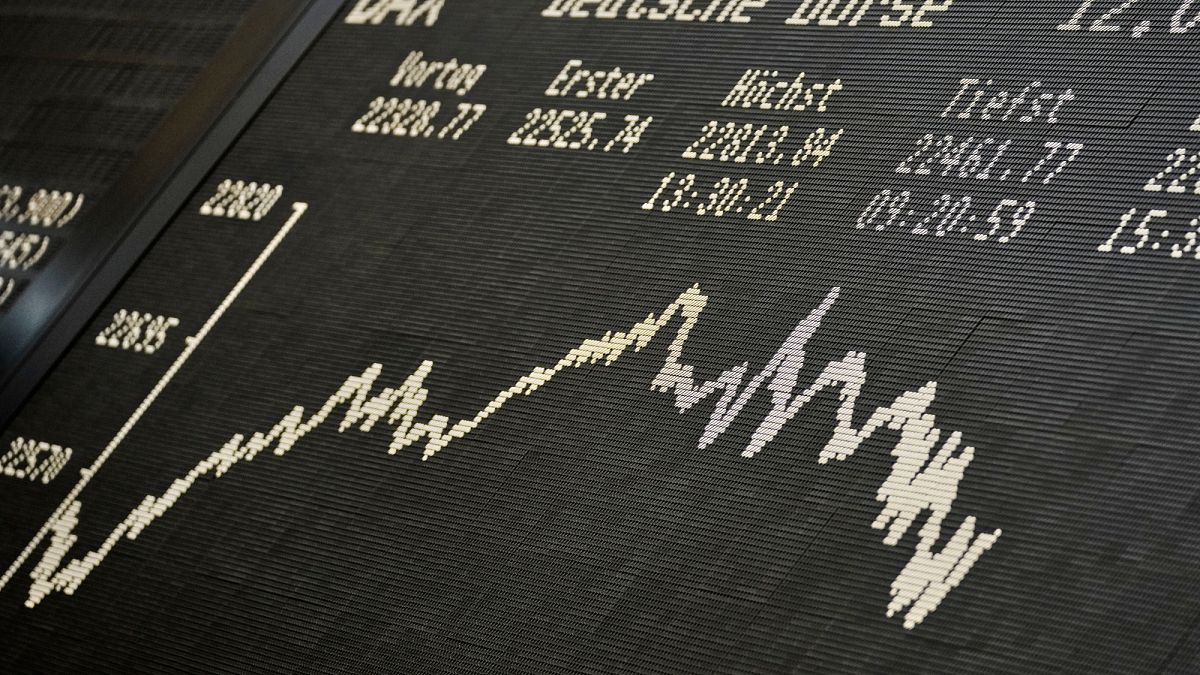Following the news that US President Donald Trump had imposed tariffs on most of the world, markets went into freefall.
On so-called ‘liberation day,’ on April 2, Trump announced sweeping taxes on imports that triggered market crashes in the US and Asia. After the US president suspended the tariffs for 90 days, prices bounced back slightly and have been extremely volatile since.
Trillions were wiped off the stock market after tariff announcements. The biggest losers were undoubtedly billionaires, who saw billions wiped off their market value, including Tesla and SpaceX CEO Elon Musk, Amazon CEO Jeff Bezos and Facebook founder Mark Zuckerberg.
But what do you do if you had put some money into ETFs or the stock market to prepare for your pension and are now seeing red?
Euronews spoke with Global Chief Investment Officer of the Private Bank of Deutsche Bank Christian Nolting and chief strategist Robert Greil from private bank Merck Finck to get their advice.
1) Considering holding off on selling stocks and shares
Both Nolting and Greil agree that it is worth trying to hold on where you can. Nolting advises against impulsive selling off.
“For one thing, the worst stock market performance days can often be followed by the best, and missing out on the latter is very costly for long-term performance.”
“But while the best driver of positive stock market returns is staying invested, remember also the role of hedging and strategic asset allocation in supporting future portfolio gains,” Nolting adds.
Greil recommends staying invested in general but to check if any individual sectors you’ve invested in carry excessive risks. This could mean reaching out to a financial advisor or keeping in the loop about markets.
He also says that stocks affected by tariffs have suffered the most, which can change very quickly.
“In the tech sector, we’ve seen how fast stocks can fall and then recover. I think at the moment, volatility can shift from one sector to another, and for that reason, people should be cautious until there’s some stabilisation,” he says.
2) Should you consider investing more now that markets have decreased?
Some investors are looking to take advantage of the market volatility by buying the dip, meaning investing whilst prices are low. However this could be risky as no one can tell if the market will continue to fall.
Nolting says that although markets are have recovered quite significantly since the beginning of April, “they are unlikely to be move sustainably above their previous levels in coming weeks,” especially with the looming threat of higher tariffs impacting businesses.
Ongoing shifts in US policy continue to leave investors and markets in a state of uncertainty, meaning investors are nervous about buying stocks and shares. This means they are more likely to hold liquid funds, meaning cash, whilst instability continues.
However, there is “still a case for ‘buying the dips,’ particularly for long-term investors in secular growth themes,” Nolting says.
On the other hand, Greil suggests remaining cautious for now: “the situation is very uncertain, and we’re seeing constant new announcements from the US administration. Because of this uncertainty, I think people should wait until the situation stabilises,” he says.
3) Should you prioritise keeping savings in cash rather than buying stocks and shares?
Deutsche Bank stresses that it doesn’t see a crisis with the stock market at the moment.
Nolting says that keeping cash in a bank account is not a bad idea, so that people remain flexible.
“But, within a portfolio context, investments such as gold, the Swiss franc and Japanese Yen may be more appropriate over the longer term, as could be rebalancing your equities exposure to more defensive sectors,” he says. He also recommends hedging as “important feature to consider for portfolio security.”
Hedging is an advance investment technique, where investors make safer investments, such as in futures or options, to offset the risk of losing too much with higher risk bets. Whilst it lowers risk, it can also reduce potential profits.
Greil says that having access to cash in bank accounts is “certainly a good idea,” but also recommends diverse investments, including in gold and safe European government bonds, for example.
He highlights that people should have a diverse portfolio and not just hold assets in cash. This means having some cash, some stocks and shares and investments in safer, less volatile investments such as gold and government bonds to minimise risks.
4) Should you be nervous about a recession?
Both Nolting and Greil say that although the risk of a recession has increased due to higher tariffs and market uncertainty, they are not panicking yet.
Nolting says he thinks that if the uncertainty stops and sustainable trade deals are made, that a US recession can be avoided. However Germany “will not be helped by its high dependence on exports.”
He adds that for the Eurozone low, but positive GDP growth is possible in 2025 and 2026.
Greil says that Merck Finck believes that whilst the probability of a global recession has risen, it “isn’t our base scenario.”
“For that to happen, tariffs would need to remain in place for a longer time, and it would need to be foreseeable that they will stay. At the moment, it’s too early to say that. If tariffs are quickly removed again to avoid damaging the economy too much, we believe a recession could be avoided,” he says.
Euronews would like to remind readers that overall investment decisions should depend on an individual’s risk profile and their investment horizon.
Read the full article here


